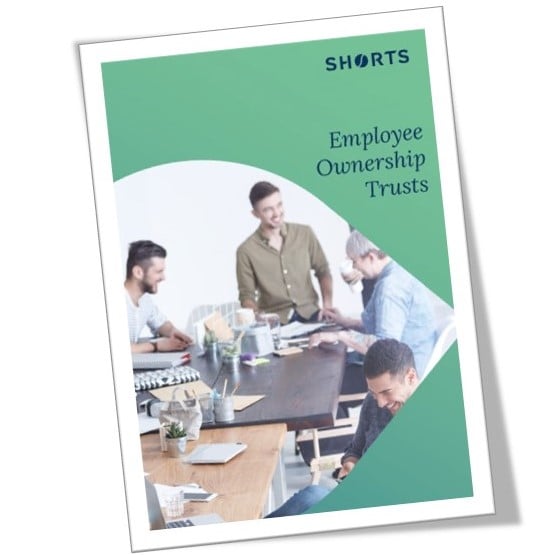
An Employee Ownership Trust (or EOT) enables a company to be owned by a Trust for the benefit of its employees.
There are several benefits for the outgoing (or exiting) owner or shareholder. These benefits include certainty of exit, a guarantee of receiving the full market value for the shares being sold, as well as a 0% Capital Gains Tax charge.
But what about the employees themselves? In this article, we will look at the ways an Employee Ownership Trust is good for the employees, and what specific benefits it can bring them.
How an EOT benefits employees
In short, employee ownership can be hugely beneficial to employees. The benefits presented by an EOT can be both financial and professional.
Tax-free bonuses of up to £3,600 for all qualifying employees
Financially speaking, a significant benefit for the employees is their potential entitlement to tax-free annual bonuses of up to £3,600.
As the EOT is set up for the benefit of all employees, these bonuses can be enjoyed by the entire team, not just the shareholders or senior management team.
These bonuses may be a single, annual lump sum, or they may be given in smaller amounts throughout the year. They will remain tax-free as long as they do not exceed £3,600 in total for a single year. Any bonus sums in excess of this threshold will be taxed as normal.
National Insurance Contributions (NICs) will still apply to the bonuses.
There are some specific conditions that a company must meet in order for this benefit to apply. These include:
- having the correct ratio of directors/office holders to all employees (which must be less than two-fifths)
- the company itself, not the trust, must pay the bonuses
- the bonuses must be paid to all eligible employees (including globally, if applicable)
Once the previous shareholders have been fully remunerated for their shares, all employees will collectively participate in the economic benefits that would normally be accrued by shareholders.
Real-life example: Jephson’s Shopfitters
The Shorts team helped Jephson’s Shopfitters transfer to an Employee Ownership Trust, and they spoke highly of the benefits of the EOT bonus scheme in the context of employee experience and opportunities:
“Most organisations are structured so that when it does well, directors, shareholders, and senior management team benefits from it. Your administrators or people on the shop floor don’t tend to get significant bonuses.
“[With an EOT] you’re spreading the wealth. It’s the same, except your immediate future has been secured, and you could earn more money going forward.”
Employees get a genuine say in how the business is managed
A typical business will have its direction dictated by the existing owner, board of directors, or senior management team, with relatively little input from employees.
When an Employee Ownership Trust owns a controlling share of the business, the beneficiaries of the EOT (i.e., the employees) get to have a say in how the business is run.
There are a variety of ways to manage this, such as through an employee council or representation on the board of directors.
There are several major benefits that this brings, including the following.
- It helps ensure that it is moving in a direction that satisfies and motivates the team, which is important for both productivity and retention.
- It ensures the directors and senior management are in touch with what the team wants, and how they feel about the organisation.
- It encourages greater long-term engagement with the company, its values, and its success.
Employee-owned companies have been studied and shown to excel in sustainability, team satisfaction and retention, and profitability.
Job security and safeguarding existing company operations
A big benefit of an EOT acquiring a controlling stake in a business is that it protects the business and its employees from the uncertainty associated with a third-party takeover.
When a business is acquired by a third party or merged with another, the incoming owners may not wish to keep the team structure as it is. This could lead to many employees fearing redundancy or drastic changes to their job roles.
An EOT removes this uncertainty, as the new leaders of the business will be existing team members who are both invested in the business, and familiar with how it works and the people that make it up.
The shareholders that are leaving can also introduce their successors gradually over a period of time. This allows them to keep involved initially and ensure the transition period is smooth.
What do real employees say about EOT?
At Shorts, we have helped several businesses successfully transition to employee ownership via the EOT model. Through this work, we have learned firsthand how it benefits not just the existing shareholders, but the employees.
One such example was T. Allen Engineering. We caught up with a member of their team, post-transition, who said the following to us:
“[EOT] gives us all a bit more job security – that’s the main thing. The long-term stability of the business is now very secure, which is important to all of us.
“I think ultimately people will now more than ever, all pull in the same direction. It’s a great incentive to keep people motivated and incentivised at the business as we all feel like we are now a bigger part of the company.”

Adam Ames
During my career, I have gained an experience and an appreciation of the many issues and opportunities faced by businesses during all market conditions and economic cycles, which I use to provide invaluable advice to clients across all areas of corporate finance including EOTs, MBOs, acquisitions, disposals and finance raising assignments.
View my articlesTags: EOT
